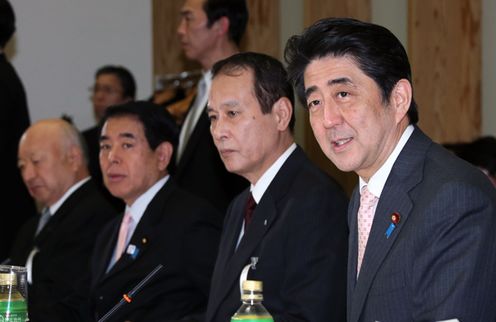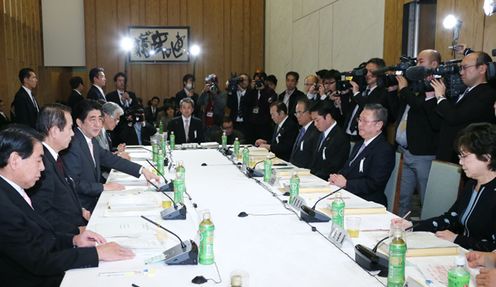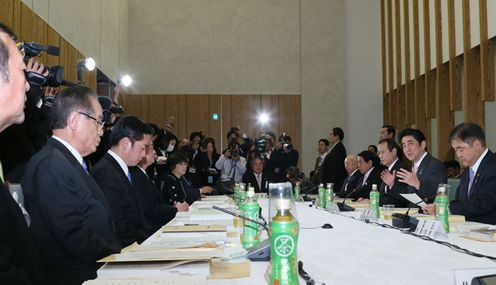Home > News > The Prime Minister in Action > April 2014 > Education Rebuilding Implementation Council
Education Rebuilding Implementation Council
Thursday, April 3, 2014

Photograph of the Prime Minister delivering an address (1)

Photograph of the Prime Minister delivering an address (2)

Photograph of the Prime Minister delivering an address (3)
Prime Minister Shinzo Abe held the 19th meeting of the Education Rebuilding Implementation Council at the Prime Minister's Office.
During the meeting, discussion took place on the future of the education system.
The Prime Minister said in his opening address,
“I would like to make some remarks upon the opening of the 19th meeting of the Education Rebuilding Implementation Council.
Educational rebuilding is a major pillar of the Abe Cabinet alongside economic revitalization. A recently published public opinion survey conducted by the Cabinet Office was featured in the news. According to the survey, respondents were asked to identify which sectors in Japan were currently moving in a positive direction, and the sector that saw the largest increase in responses was the economy. Reports state that the number of responses indicating the economy is moving in a positive direction has doubled. In fact, education has also made wide gains, increasing 6.3 points on the previous public opinion survey. This makes it the area with the second largest growth, after the economy.
This Council has compiled four proposals on countermeasures against bullying, the reform of the board of education, the reform of university education, and the reform of the screening process for university applicants. These proposals are being steadily executed, and I believe that there has been heightened interest and expectations from the public toward educational rebuilding. I would like to once again express my gratitude to you all.
Among the various specific issues related to the future of the education system, today, we will discuss higher education and vocational education.
It is extremely important for children to learn about vocations and career paths, and to deepen their thinking about the kinds of lives they wish to lead. After the end of the period of compulsory education in particular, it is important that, as much as possible, young people study with a sense of purpose. I believe that this will lead to an increase in motivation for learning.
To that end, I think it is important to consider policies to raise the stature of vocational education and foster human resources that can stand on their own as professionals.
In addition, I believe that we must have a flexible system in place that makes it possible for people to seek out new challenges in alternative career paths, even after they have selected a particular course.
Today I would like to once again ask you to continue to offer us your frank and broad insights on these issues as well.”


